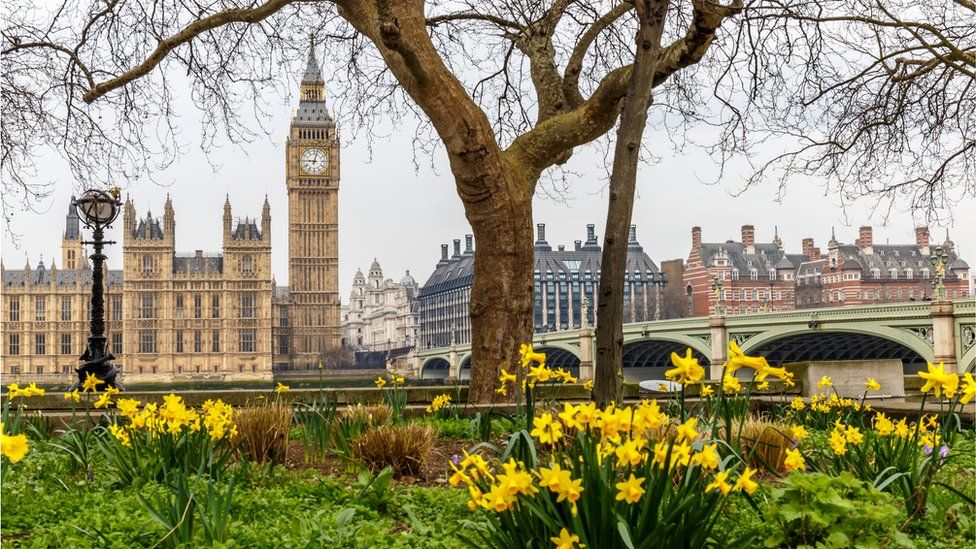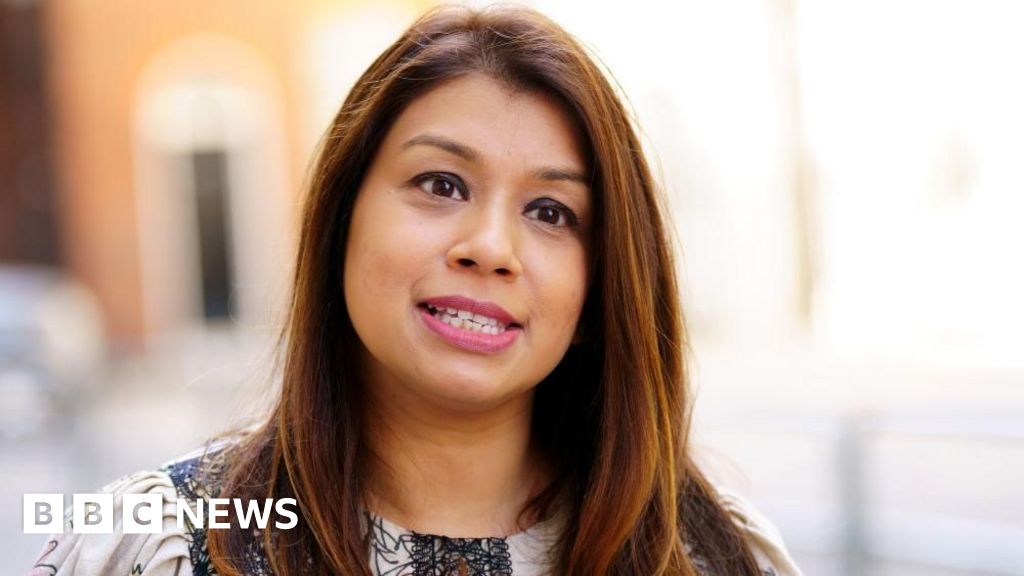ARTICLE AD BOX
 Image source, Getty Images
Image source, Getty Images
By Mark D'Arcy
Parliamentary correspondent
The Commons' fitful hibernation continues into another week of low-key law-making and ritualistic debates that few MPs will bother to attend.
Maybe it's a kind of pre-Budget torpor, but there's remarkably little action in the chamber right now.
Even when the business is padded out with a decent helping of urgent questions and government statements, MPs are still taking an early bath a couple of hours before their scheduled end of play.
Every now and then, there are rumours that some big contentious piece of legislation - the long-awaited Small Boats Bill, maybe - will arrive and re-energise the atmosphere.
But there is the Budget to come, and the week after that, Boris Johnson is due to give evidence to the Commons privileges committee into whether he misled MPs over Partygate.
In an update to its inquiry, the committee says the evidence "strongly suggests that breaches of guidance would have been obvious to Mr Johnson at the time he was at the gatherings."
In other news, senior deputy speaker Dame Eleanor Laing will be back in the chair this week, after several weeks recovering from surgery - during which time Sir Roger Gale has stood in.
Monday 6 March
Commons: Work and Pensions Questions from 14:30 GMT, with any urgent questions or government statements following at 15:30. Will some enterprising soul ask about senior civil servant and Partygate investigator Sue Gray being hired as Sir Keir Starmer's chief of staff?
The main debate will see MPs polish off the detail of the Social Security (Additional Payments) (No. 2) Bill, which authorises a means-tested additional payment of £900, in three instalments, to people receiving Universal Credit.
Westminster Hall: From 16:30, MPs will debate a petition that opposes aligning the age exemption for NHS prescription charges with the State Pension age. The petition attracted 46,000 signatures.
Committees: Levelling Up, Housing and Communities (16:00) begins what looks like a politically charged inquiry on electoral registration with evidence from academic experts and local council electoral registration officers.
Lords: Peers will debate the Levelling-Up and Regeneration Bill, in the fourth of eight days of committee stage.
Tuesday 7 March
Commons: It's Health and Social Care questions from 11:30. Conservative MP Anthony Browne will introduce a ten-minute rule bill that would require employers to pay contributions to a pension fund of the employee's choosing.
In the main debate, MPs will deal with Lords amendments to the Public Order Bill. On previous form, the government will likely seek to overturn most of the eight defeats it suffered in the Lords, most of which place limits on the Serious Disruption Orders the bill would introduce.
They will also debate two sets of regulations designed to ensure that the payments the government has been making to cut energy bills for people who heat their homes with alternative fuels, such as kerosene heating oil or biomass, are fully passed on to consumers.
Committees: Education (10:00) opens its inquiry into persistent absence and support for disadvantaged pupils, which has risen sharply since the pandemic. They will hear from the children's commissioner for England, Dame Rachel de Souza, as well as trade unions and think tanks.
Health and Social Care (10:00) will quiz senior officials from NHS England on cancer referral waiting times. In January, more than 31,000 people had waited longer than the target of 62 days following an urgent GP referral for suspected cancer.
I don't normally highlight public bill committees, but the one considering the detail of Lord Hayward's Ballot Secrecy Bill (09:00) is one for connoisseurs, because it is a rare example of a private member's bill from the House of Lords actually being considered in the Commons.
The bill, which has cross-party support, would ban the practice of family members accompanying voters into the polling booth to influence their vote.
Lords: It's the second of two days of report stage scrutiny of the National Security Bill (14:30).
The main focus will be on government amendments to the proposed Foreign Influence Registration Scheme (FIRS). After considerable criticism, ministers have rewritten most of the contentious detail, although there is still some concern over clauses dealing with foreign contacts by political parties. This debate may produce the only contested votes of the week.
Wednesday 8 March
Commons: It's Women and Equalities Questions at 11:30, followed at noon by Prime Minister's Question Time. After this, Labour's Paula Barker will introduce her ten-minute rule bill on the national minimum wage.
This is followed by the Estimates Day debate. One of the stranger rituals in the Commons, these debates are supposed to allow MPs to consider the estimates of public spending by government departments.
However, they have evolved into debates on select committee reports about specific issues, meaning they are not much of a mechanism for debating how public money is spent.
This time, they will focus on the spending of the Department for Education on childcare and early years. The key issue will probably be the cost of childcare, with the average price of full-time nursery care for a child aged under two now over £270 a week.
At the end of the debate, the House rubber-stamps all the estimates, approving many billions of public spending. These are then translated into a Supply and Appropriations Bill, which will be whizzed through the Commons in a couple of microseconds on Thursday.
Westminster Hall: Conservative MP Bim Afolami leads a debate on devolution and the future of the UK constitution (14:30).
Committees: Northern Ireland (09:30) questions Secretary of State Chris Heaton-Harris on tackling paramilitary and terrorist activity in Northern Ireland. Human Rights (15:00) holds a one-off session on how the UK's human rights laws apply to assisted dying.
Lords: It's day four of detailed committee stage debate on the Levelling-Up and Regeneration Bill (15:00).
There's also a regret motion against some regulations - Labour's Baroness Twycross will argue that the Education (School Teachers' Qualifications and Induction Arrangements) (Amendment) (England) Regulations fail to deal with the continuing fall in the number of overseas teachers qualifying to work in England.
Thursday 9 March
Commons: From 09:30, it's Culture, Media and Sport Questions (minus Digital, after the latest government shake-up). It means questions on issues like broadband and online safety now have to be directed to the new Science, Innovation and Technology department.
There will also be questions to the MPs who speak for the House of Commons Commission, the Public Accounts Commission, the Restoration and Renewal Client Board (in charge of sorting out the increasingly dilapidated buildings of the Palace of Westminster) and the Electoral Commission.
That's followed by the weekly update on the forthcoming Commons agenda, from the Leader of the House.
There's also (blink and you'll miss it) the Supply and Appropriations Bill (see Wednesday above).
The backbench debates will be International Women's Day and on Brain Tumour Research Funding.
Westminster Hall: At 13:30 Conservative Bob Blackman leads a debate on National No Smoking Day, followed by a debate on patients with rare diseases led by the DUP's Jim Shannon.
Committees: Public Accounts (10:00) looks at the government's Covid recovery plan for schools and education
Lords: Peers have their first day of debate on the detail of the Strikes (Minimum Service Levels) Bill at 11:00.
Friday 10 March
The House of Commons is not sitting, while the House of Lords will debate International Women's Day from 10:00.

 1 year ago
92
1 year ago
92








 English (US) ·
English (US) ·